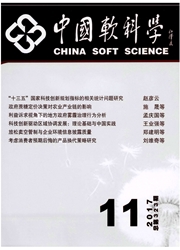

 中文摘要:
中文摘要:
在牛津大学水贫困指数和联合国开发计划署人类贫困指数基础上,分别综合考虑资源、设施、能力、使用、环境5方面和收入、支出、教育、健康、发展环境、家庭供养及就业6方面,构建适用于我国省际间进行比较的中国水贫困评价指标体系和中国经济贫困评价指标体系,利用主客观综合评价法为各指标赋以权重。对2009年中国各省市(自治区)水贫困及经济贫困水平进行评价,根据评价结果进行水贫困与经济贫困的耦合协调度分析并进行空间分异。计算结果能够反映我国水贫困水平和经济贫困程度的实际情况,并显示我国大部分地区的水贫困与经济贫困存在较高程度的耦合度,水贫困与经济贫困整体水平从西到东逐渐变好,得出我国水贫困与经济贫困为共生关系、在扶贫政策中应加入减少水贫困策略的结论。最后,从建立与完善水权制度、改善农业水利基础条件、保障饮用水安全和加强水生态保护与管理等方面对我国减贫问题提供政策启示。
 英文摘要:
英文摘要:
To explore the connection between of water poverty and economic poverty,this study built a water poverty assessment system and an economic poverty assessment system.They were built respectively according to the WPI started from Caroline Sullivan and the HPI which was started in "Human Development Report".The water poverty assessment system included natural resource,access,capital,usage and environment.And the economic poverty assessment system combined with living poverty and development poverty,which involved levels of income and expenditure,education,health,development environment,family support and employment.Weights of the index in two systems were determined by the combination weighting method,which synthesized the results of the analytic hierarchy process and entropy method.These two assessment system were used to comment the levels of water poverty and economic poverty of provinces in China.And then the results of assessment were used to conduct classification analysis and coupling relation analysis.The differences of regions and the reasons were also discussed.The conclusions showed a true reflection in China.There is a significant result of correspondence analysis between water poverty and economic poverty because of the results of high coupling relation degree.On the other hand,the overall coupled coordination degree is high in east than west. The conclusion is the water poverty and economic poverty have symbiotic relationship and water resource assistance strategy should be added in the pro-poor policies.Finally,support mechanism is put forward from several aspects,which includes the policy to establish and perfect the system of water rights,to strengthen the construction of agricultural water facilities,to ensure the safety of drinking water,and to strengthen the protection and management of water ecology,and so on.
 同期刊论文项目
同期刊论文项目
 同项目期刊论文
同项目期刊论文
 期刊信息
期刊信息
